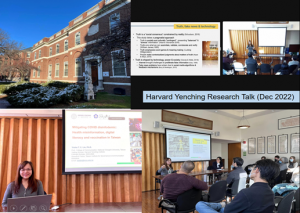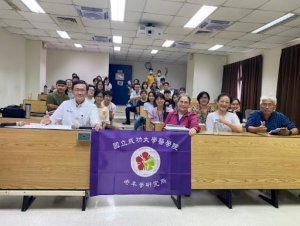Although I have lived most of my life in China, my Fulbright scholarship was the first time I had been to Taiwan. I had heard much about the beautiful island, and other members of my family had visited and told me stories, but I’d never had the chance to go. And as was to be expected, Taiwan was a beautiful place, with lush hills, beautiful beaches, hot springs, and tons of great hiking trails. Even if it rained constantly in Taipei, the people were very friendly and the city was clean, convenient and quite safe, and I was able to explore many parts of the island in my time there. However, for my Fulbright fellowship, I was not there to enjoy the beauty of Taiwan – quite the contrary, since my research tasked me with looking at the side of life here that no one usually talks about: the invisible labor of migrant workers (often called the “maid trade”), the underside of the Taiwanese economy necessitated by flaws in the nation and region’s infrastructure and social systems. Specifically, I was looking at the system and mechanisms that allowed the foreign migrant domestic worker market to flourish in Taiwan, as well as the aspects that led to abuse and exploitation in that market.
With news of their abuse in Asia making headlines worldwide, live-in maids working in foreign countries have aptly been described as “modern-day slaves.” They are part of a unique temporary migrant labor market in Asia that has burgeoned to over 5 million, by some estimates. Called the “maid trade” for short, this market operates by recruiting women from the poorer Asian countries (the Philippines, Indonesia, Vietnam, etc.), and sending them to richer Asian countries like Hong Kong, Japan, or Taiwan to live with and work for one family for two to three years. Often young and with little education, the domestic workers/maids themselves frequently have little recourse when subject to abuse, as the many laws meant to protect them in practice often oppress them.1 Migrant domestic workers live in a constant state of limbo – they are citizens of one state but residents of another; paid workers hired on the open market but confined to the intimate sphere of the home; earning more than they would back in their country but still at the bottom of the host state’s social hierarchy. Such tensions are not merely the result of high-profile incidents or even demographic patterns, but of institutional structures (government policies, support networks) that perpetuate inequalities and disadvantages – structures that differ by nationality and across host nations, with very real consequences for maids. I first discovered the systemic nature of market abuse in Hong Kong, and I came to Taiwan to compare concretely how each government handles this market and its consequences.
I was pleasantly surprised that while the “maid trade” is not a much-publicized market in Taiwan and remains opaque to most people (especially compared to Hong Kong), everyone I spoke to knew about foreign domestic workers and had opinions, even if they had no connections to the sector. Everyone had seen the migrant workers gathering in Taipei Main Station, for instance; everyone knew about the foreign domestic workers hired to help the elderly in hospitals or homes. And most people also knew how stressful it was to hire and live with a foreign domestic worker. In fact, I couldn’t leave the house without encountering someone who had something to say on the subject; being a white, blonde-haired and blue-eyed woman who could speak Mandarin fluently and Indonesian fairly well, it wasn’t hard to get the attention of the people I needed to speak to. My methods were a mix of participant observation and interviews, primarily: besides volunteering with several NGOs dedicated to helping migrant workers, I would hang around Taipei Main Station on the weekends, eating with the domestic workers on the ground and becoming their friend, while also going to different Taiwanese gatherings and community centers throughout the week to make contacts on the other side of the market. Some maids or employers I met through chance encounters on the MRT were shocked by my language ability and became some of my best informants.
Gaining the trust of either domestic workers or Taiwanese of course took some time; the first few months in Taiwan were slow-going, as my contacts usually would only share surface-level concerns with me or simply had trouble making time to see me. However, in the end, taking my time to develop strong friendships with my research subjects was more than worth it. Whether in interviews or casual conversations, both sides were eventually able to share some of their deepest feelings and concerns with me. Almost everyone, Taiwanese or foreign worker, seemed quite touched that I would come so far to talk about problems that were so mundane to the rest of the world, but so close to home for them. Once they knew they could trust me, they were happy to tell me everything they could. However, I discovered that individually, they could rarely tell me the whole story: after some time, I began to notice systematic gaps in the knowledge of both domestic workers and their employers, and I came to realize that keeping the market opaque actually served a purpose for the market itself – a purpose that didn’t always favor the Taiwanese employers or domestic workers.
The lack of transparency, misinformation and opacity in Taiwan’s “maid trade” are part of a continuous cycle perpetuated by a pronounced distrust of formal market systems. In short, Taiwanese as well as the Indonesians and Filipinas I spoke to universally prefer to trust personal references and relationships over any kind of impersonal or standardized market systems or institutions. Many express skepticism at the idea that a cold payment-for-service relationship will achieve the best results for something so close to home: the system can always be twisted to exploit or hurt them in some way. However, a longer-term personal relationship is more likely to have their interests at heart, they told me. Thus, even if public information is available, they do not make use of it consistently: they dismiss it as nothing but advertising, instead turning to friends or acquaintances to get “the truth.” This has been noted by scholars of Asian markets before: companies and individuals in many countries of Asia have very low institutionalized trust (trusting the system to keep people in line and doing the right thing), and instead rely highly on personal trust like friendships and family, very similar to the traditional Chinese concept of guanxi (關係).2 3
In practical terms, this means that everything in the migrant domestic worker market is done informally. Finding a maid to take care of one’s elderly parents or young children 24-7 and live in your house with your family is considered too intimate, too important to leave to strangers. And this attitude is understandable: when finding roommates, references and personal connections are preferable even in the West. This is an attitude shared by both maids and employers: in both Taiwan and in sending countries, maids and employers are both introduced into the market through personal connections or someone coming to the maid’s village in person, and little market research is done. Employers generally just sign on with the agency their friends referred them to, and often don’t look for new agencies even if they’ve had a bad experience. There are so many unknowns in the market as a whole, maids and employers often feel it is preferable to remain with “the devil you know” rather than take a chance on an agency with whom you have no personal connections to hold them accountable.
As for any market research and comparisons that could be done to make a more informed decision, that is limited by both the resources of the employers and maids as well as the limited information available. Most agencies that place maids with Taiwan employers do not have websites, and lawyers in Taiwan admit that some laws regarding foreign domestic helpers are difficult to understand. Technically, the government has a rating system for agencies ranging from A to D, but few employers or maids know about it, and it is not readily accessible. Thus, even if personal trust were not the major factor for this market, transparent information is sorely lacking, contributing further to mistrust in the market system.
The combination of market distrust and paucity of reliable information in Taiwan’s maid trade naturally leaves room for much misinformation, exploitation and abuse – even becoming part and parcel of how the maid market has come to function. With few authority figures to turn to for help, the sector’s opacity inspires fear and resignation in both employers and maids – they are easily lied to, and often have no idea where to start looking for accurate information. For agencies, this means that extorting money is easy, and even rewarded: in sending countries like Indonesia and the Philippines, domestic workers are egregiously overcharged for placement/training fees while being given very little in the way of useful training. Once in Taiwan, the maids can also be overcharged for simple things like paperwork, job transfers or passport renewals. The same also goes for employers: there is little to no regulation regarding how much an agency can charge employers for finding a maid, and small expenses often add up to become a heavy burden on employers, while neither maids or employers are any the wiser regarding what they are being charged for. Agencies can even charge twice for the same service because they know they are unlikely to be reported: the opacity of the market serves as a shield for them.
Market opacity also serves a latent purpose for the governments involved, too: Indonesia and the Philippines both get their workers paying jobs abroad (who would not be able to get jobs at home, usually) while the opacity quells most complaints. For Taiwan, keeping the market fairly opaque for so long allows just one role to fill many genuine needs: cleaning, cooking, elderly care, child care, even menial labor only tangentially related to domestic work. Even though maids/caretakers in Hong Kong are technically hired to just do one thing (care for an elderly patient, for example), they are almost always required to do more than their job description once they arrive (cleaning the house, cooking, etc.). Only an opaque market can allow that – if everything were transparent, there would be more obstacles to such exploitation.
It must be noted, however, that just because the opacity of the market serves a purpose does not mean that all actors are happy with it. I would be remiss to not mention the many market actors actively working against this kind of opaqueness. Labor organizations like the Taiwan International Workers’ Association (TIWA) and shelters are the most visible, but the Taiwanese government has been struggling to catch up with all the changes in the market and level the playing field. The Taiwanese government and even domestic worker agencies are not monolithic entities, and some have demonstrated a genuine desire to help. I have had the privilege to build relationships with agencies in Hong Kong and Taiwan that are genuinely trying to do a good job, trying to help both employers and domestic workers find placements that genuinely work for them. Some of them go out of their way to reconcile misunderstandings and even counsel foreign maids who are adjusting to their new life. Recently, sending countries have also recognized this as a problem and have been striving to correct market injustices, and they should be applauded for their efforts, even if there is still much work to be done. Even a handful of training agencies back in the sending countries are trying to improve, at great personal cost sometimes.
However, the way this “maid trade” market is set up, there is no incentive to do better or do the right thing by the victims – opacity rewards the easy way, and so these actors trying to operate above board remain a minority. This is a market that quite literally changes every day, with new domestic workers coming, some running away from contracts, old agencies shut down and new ones founded, and existing workers changing employers or going home. The needs are great and are constantly shifting, and because there is so little thorough or systematic research in this market (with only some exceptions 4 5 ), the responsible government ministries can’t always make the most informed decisions. Implementing certain regulations or policies can also prove difficult, such as enforcing monthly check-ups with domestic workers by agencies, as well as translation in hospitals. Furthermore, even if officials have the right idea, Taiwan is an established democracy – meaning any serious changes have to go through due process. Although proud to be a democracy, Taiwanese themselves (from employers to agencies to bystanders) complained that the process of change took too long, often resigning themselves to never getting any help from their government.
All this may seem in direct contrast to neoliberal theories of economics regarding free competition: in these theories, long championed as the path to progress, markets left to their own devices will find the best balance for all involved, with consumers eventually being willing to pay for quality service and protection. 6 7 8 However, all of these theories assume implicitly that all market actors have perfect market information – that they know all the options and are free to choose from the best. But this couldn’t be further from the truth in this case, and so normal market forces are prevented from being brought to bear on this market.9 Taiwanese employers do not discuss or compare agencies publicly, nor can they find all the ones there are to compare. There is little reward for agencies in doing a quality job, because neither employers nor maids can easily switch agencies – agencies are primarily rewarded for their breadth of connections. If they do try to conduct their business honestly, it is most often out of “the goodness of their hearts,” and even comes at a cost to the agencies (such as employers getting angry that they can’t do whatever they want with their maid, paying for maids’ legal fees, etc.). Lacking the needed infrastructure, sending countries are largely unable to conduct enforcement and monitoring, leading to many illegal agencies and many falsified documents. On the ground in Taiwan, all these factors lead to perpetuating dependency: the maids remain dependent on their employer’s goodwill and good treatment, and both maids and employers remain dependent on agencies, both in Taiwan and in the sending country.
From a wider perspective, the opacity of the “maid trade” has been important in oiling the market: it has provided a veneer of privacy and personal connection that has allowed such a complicated system to flourish. That veneer is especially important in a market like Taiwan that has an inherent distrust of impersonal business systems. But it has clearly also opened up many avenues for exploitation and misinformation, consistently disadvantaging the domestic workers but also their employers. At the end of the day, the “maid trade” is not a normal market, and frankly may never become one: it consistently deals with more vulnerable subjects, involves crucial aspects of life that are private, requires the cooperation of several governments, and creates an environment where work and personal life cannot be separate. Thus, a simple job market website would likely be useless here, no matter how transparent one tried to make it. Some have argued that the market itself is somewhat unnatural, tearing women from their families and children for three years at a time and forcing Taiwanese families to accept a stranger into their house; however, Taiwan at the moment has no other affordable alternatives for elderly care or house cleaning, and few Taiwanese want to take these domestic work jobs; meanwhile, sending countries are struggling to get their rural economies started. So for the foreseeable future, the maid trade isn’t going anywhere.
However, even if market transparency in the maid trade cannot be handled the same way as, say, a toy market or manufacturing, more readily available information and easier accessibility would go a long way towards curtailing vulnerability. Even by its inaction, the Taiwanese, Indonesian, and Philippine governments are silently sanctioning the opacity and misuse of the market, whether they mean to or not. Finding ways to spread better information, in my own experience of advising employers and maids, would greatly reduce stress on both Taiwanese employers and maids, reward the local agencies that deserve it with more business, and even the Taiwanese government would be able to allow their citizens to be less concerned about basic survival and better able to focus on development and innovation. One way or another, however, the lack of transparency in the migrant domestic worker market is a problem that needs to be addressed urgently.
[1] Rodriguez, Robyn. 2010. Migrants for Export: How the Philippine State Brokers Labor to the World. Minneapolis: University of Minnesota Press.
[2] Witt, Michael A., and Gordon Redding. 2013. “Asian business systems: institutional comparison, clusters and implications for varieties of capitalism and business systems theory.” Socio-Economic Review 11(2): 265-300.
[3] Bourdieu, Pierre. 1990 [1979]. The Logic of Practice. Stanford University Press.
[4] Loveband, Anne. 2004. “Positioning the product: Indonesian migrant women workers in Taiwan.” Journal of Contemporary Asia 34(3): 336-348.
[5] Lan, Pei-Chia. 2006. Global Cinderellas: Migrant Domestics and Newly Rich Employers in Taiwan. Durham and London: Duke University Press.
[6] Mitchell, Timothy. 2005. “The Work of Economics: How a Discipline Makes its World.” European Journal of Sociology. 47(2): 297-320.
[7] Friedman, Milton. 1982 (1962). Capitalism and Freedom. The University of Chicago Press.
[8] Miller, Daniel. 2002. “Turning Callon the right way up.” Economy and Society 31(2): 218-233.
[9] See, for example: Bourdieu, Pierre. 1998. “The Economy of Symbolic Goods.” Pp. 92-123 in Practical Reason. Stanford University Press.







